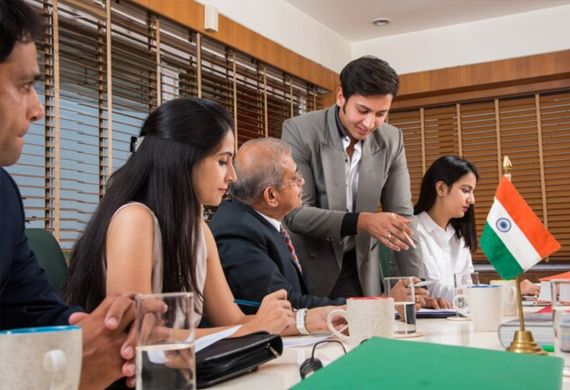
India Adds Gender Equality Clause in Trade Deal with UK
By: WE Staff | Thursday, 31 July 2025
- India signs its first complete chapter on gender equality in a trade deal in the CETA with the UK.
- It is a shift in methodology from India's past stance of keeping out non-trade issues.
India has enrolled for the first time in a full chapter on gender equality in trade, with the recently signed Comprehensive Economic and Trade Agreement (CETA) between the nation and the UK, besides including an express commitment in the preamble to “increasing women's access to and ability to benefit maximally from the opportunities generated by this Agreement”, as gender experts are applauding.
Prior to that, the India-UAE Comprehensive Economic Partnership Agreement (CEPA) 2022 was the only one that had a mention in the chapter on micro, small and medium-sized enterprises towards facilitation of bilateral cooperation on youth women's SMEs, start-ups.
It also enables cooperation between such SMEs and their participation in international trade as well as information sharing on entrepreneur education and awareness programmes for women and youth to enable the entrepreneurial ecosystem.
India has been an active promoter of gender equality in international opportunities, being one of the first countries to ratify the United Nations General Assembly's Convention on the Elimination of all Forms of Discrimination Against Women (CEDAW), adopted in 1979.
It is a signatory to the Beijing Declaration and Platform for Action of 1995 in support of women empowerment as well as being strongly committed to the achievement of Goal 5 of the UN's 17 sustainable development goals (SDGs) aimed at achieving gender equality and empowerment of all women and girls.
In addition, India supports the Addis Ababa Action Agenda (2015) that identifies the important role of international trade as a means to spur economic growth which is inclusive and leads to poverty reduction as well as specifically highlights its role in promoting the empowerment of women.
However, traditionally India has steered clear of connecting so-called ‘non-trade/progressive issues’ such as human rights, labor standards, gender and environment with world trade being bilateral and multilateral, largely viewing them as ‘veiled protectionism’.
Most Viewed
- 1 Women's Health Startup HerMD Closing Doors Amid Industry Challenges
- 2 5 Famous Women in Indian Armed Forces
- 3 Saudi Women No longer Require Male Permission for Clothing Choices, says Prince MbS
- 4 Kolkata Medtech Startup Innovodigm Raises Rs 5.5 Crore Seed Funding Led by IAN Group
- 5 Yamunanagar's Kashish Kalra Honoured after Securing 111th Rank in UPSC Civil Services Exam
- 6 Madurai Appoints Its First Woman Corporation Head
- 7 IAS Vijayalakshmi Bidari Appointed as the new Nagpur Divisional Commissioner
- 8 American Entrepreneur Lucy Guo Overtakes T Swift to become Youngest Female Billionaire
- 9 ICC Women's World Cup 2025 Trophy Showcased at Indore's Holkar Stadium
- 10 Aparna Saxena's Beauty Venture AntiNorm Launches in India
- 11 Vidya Nataraj Co-Founded BlueStone Jewellery & Lifestyle files IPO
- 12 5 Women Freedom Fighters of India
- 13 Dr. G Krishnapriya appointed as CEO for Trichy
- 14 M3M & Sirona Partner to Introduce Menstrual Hygiene Vending Machines in 15 Locations
- 15 Punjab Govt launches SHE Cohort 3.0 Supporting Tech-led Women Startups
- 16 Indian origin Lawyer, Sweena Pannu appointed as the US New Superior Court Judge
- 17 The Aurora Tech Award recognizes 4 Indian Women-led Startups
- 18 Kerala's Republic Day parade featured an all-female tableau
- 19 Manisha Kabbur Becomes Karnataka's First Woman International Karate Coach
- 20 Director K. S. Ravikumar's Daughter Maalica Ravikumar Launches Life Coaching Company 'Evergrowth Academy' for Women
- 21 Leezu's Raises Pre-Seed Funding to Accelerate Growth in Sexual Wellness Industry
- 22 Sattu: Super-easy summer drink for PCOS gut healing
- 23 Swathi Nelabhatla creates Sitha App, India's First Women-Exclusive Gig Platform
- 24 7 Timeless Female Kathak Dancers & their Iconic Legacies
- 25 Meet 7 Iconic Women Architects of Modern India & their Most Impactful Work
- 26 This Woman-led Insuretech Startup is Helping Bridge the Education Financing Gap in India
- 27 Women Leaders Share Lessons Learnt from India Women's WC Win
- 28 5 Enterprising Women Founders Powering Singapore's Tech & Innovation Landscape
- 29 4 Women. 4 Stories. One Vision for Smarter, Stronger Healthcare
- 30 Global Gender Gap Narrows to 68.8%, But Full Equality 123 Years Away: WEF Report 2025
- 31 Changemakers: 7 Women Entrepreneurs Taking the Make in India Movement Forward
- 32 Meet Lucy Guo, The Youngest Self-Made Female Billionaire Disrupting Tech
- 33 How Women are Driving India's Festive Online Shopping Surge






